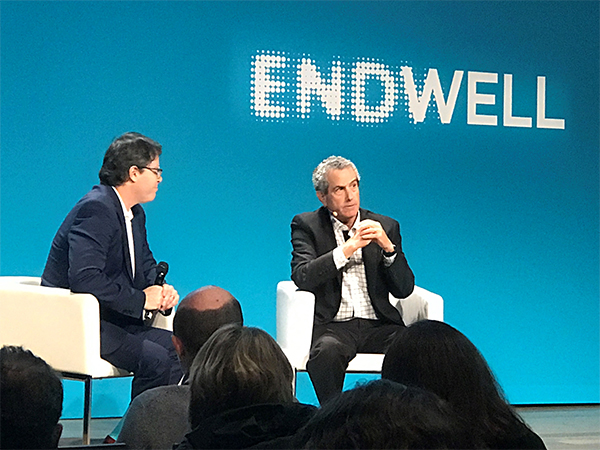The language we use is crucial to the wider dissemination of the best care possible for patients nearing the end of life, according to Ira Byock, MD, one of the country’s leading voices in palliative care practice and advocacy.
Dr. Byock—a palliative care physician, author, and the Chief Medical Officer at the Institute for Human Caring at Providence St. Joseph Health System—spoke about the power of words Dec. 6 at the End Well Symposium in San Francisco, during a joint session with Anthony Shore, an award-winning linguist and branding consultant.
“I have an obsession about language,” Dr, Byock said, calling words primal human tools that can either constrain people or open them up to all possibilities. Palliative care and hospice have a serious image problem that can be addressed if we use better language, he explained.
“Avoidance of suffering, while an important part of what palliative care does, is not a great marketing phrase,” Dr. Byock said. “What can people expect—what can they hope for—in the face of serious and terminal illnesses? I believe we have to be more assertive and more provocative. I want to associate palliative care with well-being. I think our brand is that we give the best care possible through the end of life, starting right now.”

Choosing the Right Words
Dr. Byock said he prefers the terms sick people and dying people rather than just the sick or the dying, which distance us from them. He also believes dying well is a more powerful phrase than a good death because it better captures what is possible to achieve in life’s final chapters. Dying is part of living, and life completion conveys more than life ending.
He said he uses the phrase dying well both as an adverb, meaning dying peacefully with as little pain and suffering and complications as possible, and as an adjective—dying in an actual state of wellness. “Our language would change if we talked about the ability to die well, and continuing to grow through the end of life,” Dr. Byock said. “Culturally, we ought to be a component of the larger wellness movement.”
During their End Well talk, Shore emphasized the importance of aphorisms and metaphors in conveying deeper truths about the human encounter with mortality. The more poetically and memorably they are expressed, the more open people will be to hearing them.
“The way we frame ideas and the words we use have a great deal to do with how the end of life is experienced,” he said. “If someone who is dying hears others talking about dying in a dehumanizing way, it will be more difficult for them to have a transformative experience.”
Redefining Serious Illnesses Such As Alzheimer’s
Shore suggested that Alzheimer’s disease could be the next big target for transforming our cultural understanding of these issues. Current expectations help to create the environment that predestines people with Alzheimer’s to be helpless and hopeless. If we called it a late-life learning disability, he said, the people who have Alzheimer’s might be treated differently.
Although Alzehimer’s is an incurable terminal illness that robs millions of older patients of their cognitive abilities, it is not hopeless, Dr. Byock said. “People living with Alzheimer’s can retain a capacity for well-being—even joy. If dignity and worth are inherent in humans, how can we care for them in ways that honor and celebrate their lives?”
The End Well Symposium is an annual event that features a full day of Ted Talk-type presentations from a widely diverse group of professionals dedicated to building a movement to improve the end-of-life experience.




